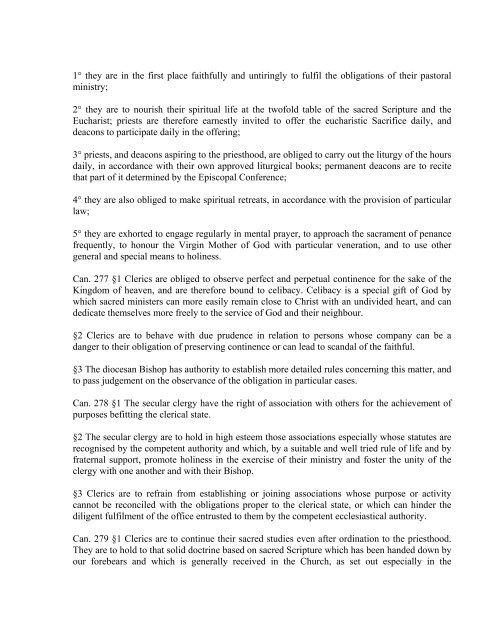Code_of_Canon_Law
Code_of_Canon_Law
Code_of_Canon_Law
Create successful ePaper yourself
Turn your PDF publications into a flip-book with our unique Google optimized e-Paper software.
1° they are in the first place faithfully and untiringly to fulfil the obligations <strong>of</strong> their pastoral<br />
ministry;<br />
2° they are to nourish their spiritual life at the tw<strong>of</strong>old table <strong>of</strong> the sacred Scripture and the<br />
Eucharist; priests are therefore earnestly invited to <strong>of</strong>fer the eucharistic Sacrifice daily, and<br />
deacons to participate daily in the <strong>of</strong>fering;<br />
3° priests, and deacons aspiring to the priesthood, are obliged to carry out the liturgy <strong>of</strong> the hours<br />
daily, in accordance with their own approved liturgical books; permanent deacons are to recite<br />
that part <strong>of</strong> it determined by the Episcopal Conference;<br />
4° they are also obliged to make spiritual retreats, in accordance with the provision <strong>of</strong> particular<br />
law;<br />
5° they are exhorted to engage regularly in mental prayer, to approach the sacrament <strong>of</strong> penance<br />
frequently, to honour the Virgin Mother <strong>of</strong> God with particular veneration, and to use other<br />
general and special means to holiness.<br />
Can. 277 §1 Clerics are obliged to observe perfect and perpetual continence for the sake <strong>of</strong> the<br />
Kingdom <strong>of</strong> heaven, and are therefore bound to celibacy. Celibacy is a special gift <strong>of</strong> God by<br />
which sacred ministers can more easily remain close to Christ with an undivided heart, and can<br />
dedicate themselves more freely to the service <strong>of</strong> God and their neighbour.<br />
§2 Clerics are to behave with due prudence in relation to persons whose company can be a<br />
danger to their obligation <strong>of</strong> preserving continence or can lead to scandal <strong>of</strong> the faithful.<br />
§3 The diocesan Bishop has authority to establish more detailed rules concerning this matter, and<br />
to pass judgement on the observance <strong>of</strong> the obligation in particular cases.<br />
Can. 278 §1 The secular clergy have the right <strong>of</strong> association with others for the achievement <strong>of</strong><br />
purposes befitting the clerical state.<br />
§2 The secular clergy are to hold in high esteem those associations especially whose statutes are<br />
recognised by the competent authority and which, by a suitable and well tried rule <strong>of</strong> life and by<br />
fraternal support, promote holiness in the exercise <strong>of</strong> their ministry and foster the unity <strong>of</strong> the<br />
clergy with one another and with their Bishop.<br />
§3 Clerics are to refrain from establishing or joining associations whose purpose or activity<br />
cannot be reconciled with the obligations proper to the clerical state, or which can hinder the<br />
diligent fulfilment <strong>of</strong> the <strong>of</strong>fice entrusted to them by the competent ecclesiastical authority.<br />
Can. 279 §1 Clerics are to continue their sacred studies even after ordination to the priesthood.<br />
They are to hold to that solid doctrine based on sacred Scripture which has been handed down by<br />
our forebears and which is generally received in the Church, as set out especially in the












![[Pham_Sherisse]_Frommer's_Southeast_Asia(Book4You)](https://img.yumpu.com/38206466/1/166x260/pham-sherisse-frommers-southeast-asiabook4you.jpg?quality=85)




